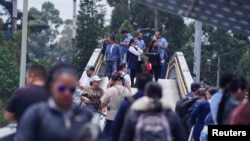Blocking the country’s main roads The pressure exerted by transporters in Colombia to make President Gustavo Petro listen to their demands in light of the executive’s decision to increase the price of diesel is already affecting supplies in several cities.
Bogotá has registered a decrease of nearly 55% in the number of tons of food in the collection center, while in other cities such as Cúcuta and Bucaramanga —in the northeast of the country— a decrease of more than 40% in the number of tons of food has been registered, according to authorities.
Other cities have seen food prices rise due to lockdowns.
In addition to affecting the food supply in several cities, the measure has also affected users of public transportation and children who cannot attend school in person.
In response, the government has begun clearing the roads using riot police, known as the Unit for Dialogue and Maintenance of Order (UNDMO).
Since Monday, September 2, Colombia’s main roads have been blocked by a strike by transporters who are protesting against the rise in fuel prices, particularly diesel, which has risen by 1,904 pesos (about 46 cents) since Saturday, August 31.
Why are truck drivers protesting in Colombia?
In Colombia, fuels are financed through the state-owned Fuel Price Stabilization Fund (Fepc), which subsidizes the cost of gasoline and diesel, also known as ACPM (Fuel Oil for Motors).
However, since October of last year, the executive decided to gradually increase the cost of gasoline, pointing out that there was a deficit of about 2.392 billion dollars in the Fepc, without announcing an increase in diesel until June of this year when a decree was issued establishing the increase starting last Saturday.
The measure established that the price of a gallon of diesel went from 9,456 Colombian pesos (around 2.30 dollars) to 11,360 pesos (around 2.70 dollars). However, the decision led to the blockade of roads by the union, which has been joined by bus, motorcycle and taxi drivers.
The Voice of America spoke with Andrés Castro, professor and researcher at the Universidad del Rosario and Los Andes in Bogotá, who explained that it was “necessary and responsible” to adjust the price of diesel to international prices due to the “fiscal gap” generated by the price freeze.
“It is responsible to adjust the price. It has already been done with gasoline, where the current price was gradually reached. So, in that order, the adjustment is reasonable and objective, but this has had a political element where everyone is taking advantage of this circumstance,” Andrés Castro told the Voice of America via Zoom.
What are carriers asking for now?
The transporters have made a series of requests to end the strike, including the creation of the National Transport Fund, a toll law and, mainly, the annulment of the decree that adjusts the price of diesel.
“With the increase, the price of diesel is very expensive for us. Added to the tolls, which are very expensive, our profits go to paying tolls and fuel. In other words, we will have absolutely no profit left. That is why we are on strike until the government tells us that it will not raise diesel prices any further,” he told the newspaper. VOA Transport worker Edwar Parra, who is participating in the demonstration on the road that connects Bogotá with the east of the country.
Since then, freight transporters and the government have held a negotiating table for several days to reach an agreement on the rise in the price of diesel, the first increase in more than four years.
“The price of diesel has been frozen since January 1, 2020, 56 months with the price frozen. We have managed to close the gap in gasoline and we still have to close the gap in diesel. This is an inefficient subsidy for the Colombian economy, which generates a huge fiscal deficit and does not contribute to the sanitation of public finances. For that reason, we have to adjust the price,” Finance Minister Ricardo Bonilla told the media on Thursday.
Political implications
The Colombian president received a wave of criticism after his presidential address on Wednesday, broadcast to the entire country, in which he did not refer to the transport workers’ strike.
“With his speech on Wednesday, President Petro made a wrong decision by avoiding speaking about the issue. So we see that the transporters’ protest is taking place at a very critical moment and that it will surely have a significant impact in terms of governability,” Camilo González, a professor at the Universidad Javeriana in Bogotá, told VOA.
In this regard, González points out that the protests by transporters “could” leave the government in a “difficult” situation in the face of a “key” legislative period for its reforms in the penultimate year of its mandate, due to the “difficulty” of finding a solution to a “problem” that could “hinder” its support in the legislature.
For now, the government reiterated this afternoon at a press conference that the proposal for a gradual increase of 800 Colombian pesos until December is “quite generous” and that with this proposal the executive “has reached its limit.”
[Con información de AP]
Connect with the Voice of America! Subscribe to our channels YouTube, WhatsApp and the newsletter. Activate notifications and follow us on Facebook, X and Instagram.















Add Comment